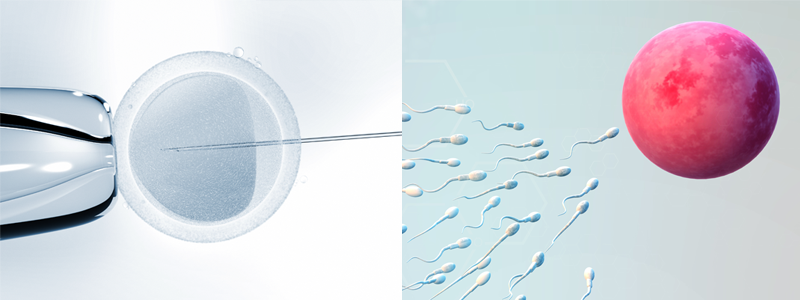Going through an ectopic pregnancy can be a scary and emotionally challenging time. If you have had an ectopic pregnancy, it’s understandable if you have concerns about how this experience may have impacted your fertility.
Thankfully, research suggests that up to 85% of women who have suffered an ectopic pregnancy will go on to have a healthy pregnancy within two years. Some of these women will conceive naturally, whilst others will need the help of fertility treatments like IVF.
If you need IVF after an ectopic pregnancy, it’s important to find a clinic who have knowledge and experience in treating women like you.
At CREATE Fertility, we have helped thousands of women who have been through an ectopic pregnancy conceive healthy, viable pregnancies through mild and natural IVF techniques.
What is an ectopic pregnancy?
During a typical pregnancy, an egg is fertilised in the fallopian tube before travelling to the uterus where it implants and develops into a baby. The term ectopic pregnancy describes any pregnancy that implants outside of the uterus. Roughly 1 in every 90 pregnancies in the UK is ectopic.
Ectopic pregnancies can happen in a variety of places in the body, including:
- Tubal ectopic pregnancy: This type of pregnancy occurs when a fertilised egg implants in the fallopian tube instead of the uterine cavity. Tubal pregnancies are the most common type of ectopic pregnancy, accounting for around 95% of cases.
- Ovarian ectopic pregnancy: Roughly 3% of ectopic pregnancies take place in the ovary. Researchers aren’t completely sure why ovarian ectopic pregnancies happen, but they think this condition may arise when an egg is fertilised whilst it’s still inside its follicle in the ovary. Another hypothesis is that the fertilised egg travels backwards towards the ovary instead of to the uterus like it’s meant to.
- Other locations: In very rare instances, ectopic pregnancies occur in other parts of the body like the abdomen, cervix, or a caesarean scar.
Sadly, a fertilised egg (embryo) is extremely unlikely to survive an ectopic pregnancy, regardless of its location. This is because the uterus is the only place in the body designed to grow with and support a baby as it develops. If a pregnancy occurs outside of the uterus, the embryo will not have the space or resources it needs to survive.
If an ectopic pregnancy is left untreated, the growing embryo could cause the affected area to burst. This is called a ruptured ectopic pregnancy. If an ectopic pregnancy ruptures, it can result in major internal bleeding and is therefore considered a serious medical emergency. In very rare situations (0.2% of cases in the UK), a ruptured ectopic pregnancy proves fatal for the pregnant woman.
What causes an ectopic pregnancy?
Often, it’s difficult to know why an ectopic pregnancy has happened. In fact, research suggests that up to half of all women who suffer an ectopic pregnancy have no pre-existing risk factors for this condition at all.
We do, however, know that the following factors can increase the chance of having an ectopic pregnancy:
- Pelvic inflammatory disease: Pelvic inflammatory disease is the inflammation of the reproductive system, which typically arises from a sexually transmitted disease like chlamydia. The inflammation associated with pelvic inflammatory disease can cause damage or scarring to the fallopian tubes, which in turn can make it more difficult for a fertilised egg to reach the uterus. Studies have found that 10% of pregnancies in women with pelvic inflammatory disease are ectopic.
- Previous ectopic pregnancy: For women who have already had an ectopic pregnancy, the risk of another pregnancy being ectopic is 1 in 10.
- Increased age: Research suggests that women aged 35 and above can be up to 4 to 8 times more likely to suffer an ectopic pregnancy than women under the age of 35. It’s thought this may happen because of an accumulation of risk factors over time.
- Smoking: Smoking cigarettes has been shown to change the function of the cells in the fallopian tubes, which researchers think may explain why women who smoke are more likely to suffer an ectopic pregnancy than those who do not.
- Previous tubal surgery: Surgery to the fallopian tubes can cause damage which may make an ectopic pregnancy more likely.
Your CREATE consultant will be able to answer any questions you have about ectopic pregnancies, and your risk of experiencing one, during your initial consultation. In this appointment, your consultant will also discuss the results of your advanced ultrasound scan. This ultrasound scan gives a detailed look at your ovaries and uterus to assess your fertility potential. Your consultant will use the results of your scan, along with your medical history, to create a treatment plan that’s tailored to you and your needs. In some cases, your consultant may recommend additional fertility tests (e.g., investigations of the fallopian tubes) before treatment begins.
Ectopic pregnancy symptoms
According to the NHS, the symptoms of an ectopic pregnancy are most likely to start between weeks 4 and 12 of pregnancy, though some women don’t have any obvious symptoms at all. In addition to a positive pregnancy test, ectopic pregnancy symptoms may include:
- Pain on one side of the lower stomach
- Vaginal bleeding
- Discomfort when going to the toilet
- Shoulder tip pain
Although the above might be symptoms of an ectopic pregnancy, they could also suggest a different medical condition. Please get in touch with your healthcare team if you think you may be experiencing an ectopic pregnancy so they can run further diagnostic tests.
Diagnosing an ectopic pregnancy
Because the symptoms of an ectopic pregnancy could also be caused by another medical condition, you may have to have additional tests to confirm the diagnosis. These tests could include:
- Pregnancy test: If you have not already taken a pregnancy test, your doctor will ask you to take one to confirm that you are pregnant.
- Vaginal ultrasound scan: This often allows medical staff to see the location of a pregnancy, as a gestational sac will be visible either inside or outside of the uterus. Occasionally, the location of the pregnancy may be hard to see. This is called a pregnancy of unknown location.
- hCG blood tests: Human chorionic gonadotropin (hCG) is a hormone that is typically only released during pregnancy. During an ectopic pregnancy, hCG levels tend to be lower and rise more slowly than during a pregnancy that has implanted in the uterus. Medical staff can monitor hCG levels every few days to help determine whether a pregnancy is ectopic in nature.
- Laparoscopic surgery: Occasionally, it may be necessary to perform keyhole surgery to confirm an ectopic pregnancy. A surgeon will check the reproductive system and if an ectopic pregnancy is found, it will be removed during the operation.
Treating an ectopic pregnancy
An ectopic pregnancy might not be discovered until a routine early pregnancy scan. Because of this, the diagnosis of an ectopic pregnancy can often come as a shock, and it may take a while for it to sink in.
If you experience an ectopic pregnancy whilst having treatment with CREATE, our clinical team will work with your local NHS hospital’s Early Pregnancy Assessment Unit (EPAU) to look after you and make sure you get the care and support you need. The CREATE clinical team will make sure you are supported and kept updated throughout the process.
Emotionally, everyone responds differently to the diagnosis of an ectopic pregnancy. We understand how difficult this time will be for you, especially if your pregnancy was long awaited as the result of fertility treatment. Give yourself time to work through your feelings, which could include shock and fear as well as anger and sadness.
There are three methods that can be used to treat an ectopic pregnancy. Unfortunately, all these treatment options will ultimately end the pregnancy. Although this may be emotionally difficult, it’s important that the ectopic pregnancy is removed before it threatens your health.
- Expectant management: Ectopic pregnancies sometimes end on their own and do not require medical treatment. If you are in the early stages of an ectopic pregnancy and have minimal or no symptoms, you may be recommended this treatment option.
- Medical management: Another option is to have an injection of a drug called methotrexate. This medication blocks the embryo from growing and the ectopic pregnancy resolves on its own. This may not be suitable for women who are further along in pregnancy.
- Surgical management: Sometimes, a doctor will recommend that the ectopic pregnancy is removed surgically. If it is a tubal pregnancy, it may be possible to save the affected fallopian tube or it might have to be removed.
Recovery times: physical and emotional
Knowing when to start trying for another pregnancy after an ectopic pregnancy can be tough. Physically, the general advice is to wait for at least 2 periods after treatment, or 3 months if you were treated with methotrexate.
Feeling emotionally ready to try again may take much longer. There’s no right or wrong amount of time to wait once you’ve recovered physically, and the decision about when to try for another pregnancy is completely up to you.
Most women who have had an ectopic pregnancy will be able to get pregnant again, even if they've had a fallopian tube removed. Sometimes this will be a natural pregnancy, whilst in other situations fertility treatments like IVF are necessary.
If you become pregnant again naturally, you should let your healthcare team know as soon as possible. This will allow them to conduct early pregnancy scans to check everything looks healthy. If you become pregnant following IVF treatment, then you will have an early pregnancy scan as part of your treatment.
IVF after an ectopic pregnancy
At CREATE Fertility, we are experienced in helping women who have suffered ectopic pregnancies conceive healthy, viable pregnancies. We specialise in natural and mild IVF, meaning we work within a woman's natural cycle and focus on the quality of eggs and embryos, not the quantity.
Where to find support
If you are finding it difficult to cope with the emotional strain of going through an ectopic pregnancy, it may be useful to reach out to a therapist or support group. Some examples of organisations you may find helpful include The Ectopic Pregnancy Trust and The Ectopic Pregnancy Foundation.
At CREATE Fertility, we offer comprehensive sessions with our fertility coach, Pauline Barrett, who has years of experience caring for those going through fertility treatment. For more information about this service, please click here. If you would like, we can also arrange for you to see a licensed counsellor at no additional charge.
If you’re looking to find out more about the treatment we do, get in touch with our team today.







